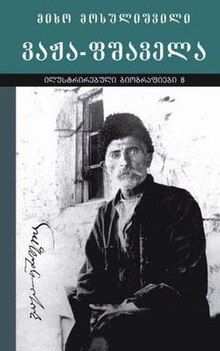Vazha-Pshavela (biographical novel)
 | |
| Author | Miho Mosulishvili |
|---|---|
| Original title | ვაჟა–ფშაველა |
| Illustrator | Nino Kapanadze |
| Cover artist | Nino Kapanadze |
| Language | Georgian |
| Series | The Illustrative Biographies from Publishing house Pegasi |
| Genre | Biography |
| Publisher | Pegasi |
Publication date | 2011 |
| Publication place | |
| Media type | Book (Print, Microform, Electronic, etc.) |
| Pages | 383 p. : ill. ; 20 cm. |
| ISBN | 978-9941917967 |
| OCLC | 755907118 |
| LC Class | PK9169.V38 Z79 2011 |
| Preceded by | Bendela, 2003 |
| Followed by | Helessa, 2012 |
Vazha-Pshavela (ვაჟა–ფშაველა) is a 2011 Georgian biographical novel by author Miho Mosulishvili.
Anniversaries with which UNESCO is associated in 2010-2011
[edit]The General Conference, by its 35C/Resolution 72, approved the following list of anniversaries with which UNESCO is associated in 2010-2011 (listed in the French alphabetical order of Member States):
(24) 150th anniversary of the birth of Vaja-Pshavela, writer (1861-1915) (Georgia)[1]
150th anniversary of the birth of Vaja-Pshavela
[edit]150th anniversary of the birth of Vaja-Pshavela, writer (1861-1915):
Vaja-Pshavela (the pseudonym of Luka Razikashvili, 1861-1915) was a Georgian thinker, poet and writer. Vaja-Pshavela's poetry represents the summit of nineteenth-century Georgian realism. He was born in the small Pshavian village of Chargali. He graduated from teachers' seminary and studied law at Saint Petersburg University. Vaja-Pshavela wrote most of his verses, poems, and stories near his native village. His works are mainly devoted to human relationships with the material world. The national epic works of Georgian poetry in the nineteenth century and the revival of poetic epos are also connected with his name. Heroism, tragedy, and humanity define the epic creativity of Vaja-Pshavela. His poems and narrative stories are widely translated into several languages.[2]
Outline
[edit]This biographical novel will we know what to look like Vaja-Pshavela: from ancient Greek mythology characters Laocoön, the divine poet Homer and the genius Italian composer Giuseppe Verdi.
We see that it easily can be compared to the same level of creativity as Ovid, Goethe, Shakespeare, Robert Burns; but we also see how the original is Vaja-Pshavela and how many great things it means in today's world, whether it is involved in the confrontation of East-West.
The book Vaja-Pshavela (And Phelypaea coccinea[3] looks in chasm)' show new version of life Vaja-Pshavela and unique style of his thinking.
The discovery may be regarded as the author's observation that the five epic poems of Vaja-Pshavela (Aluda Ketelauri (1888), Bakhtrioni (1892), Host and Guest[4] (1893), The avenger of the blood (1897), Snake eater[5] (1901)) is based on the principle Golden ratio, thus this poems resembles the works of Ancient and Renaissance authors.
Miho Mosulishvili asserts that Vaja-Pshavela rises from the depth of creativity of Georgian mythology, which makes it an original event in the world's literature and will significantly increase the magnitude of Georgian literature.
Characters
[edit]- Vaja-Pshavela
- Ilia Chavchavadze
- Giuseppe Verdi
- Akaki Tsereteli
- Ernest Hemingway
- Titsian Tabidze
- Johann Wolfgang von Goethe
- Anandavardhana
And others.
Awards
[edit]- October 8, 2011 - Gala (literary prize) in nomination: 'The best handbook'[6]
Release details
[edit]- 2011, Georgia, ვაჟა–ფშაველა (ISBN 9789941917967), Pub. date 25 May 2011, Hardcover (First edition[7] - in Georgian)
References
[edit]- ^ "Anniversaries - Anniversaries with which UNESCO is associated in 2010-2011 | unesco.org". portal.unesco.org. Archived from the original on 2010-01-24.
- ^ UNESCO Brochure, page 68
- ^ "Phelypaea coccinea - Poir". eunis.eea.europa.eu.
- ^ "Vazha-Pshavela (1861–1915) - Host and Guest".
- ^ "Ვაჟა–ფშაველა - Page 5". Archived from the original on 2011-10-06. Retrieved 2012-05-27.
- ^ Mikho Mosulishvili (8 October 2011). "Vazha-Pshavela: Gala (literary prize) winner book" – via YouTube.
- ^ Mixo Mosulišvili (2011), Vazha-Pshavela (Vaja-Pshavela ed.), Tbilisi, Georgia: Pegasi, OL 24988541M
